 5 citations,
August 2018 in “European Psychiatry”
5 citations,
August 2018 in “European Psychiatry” Some psychiatric drugs can cause severe hair loss, especially valproic acid, and it's more likely in women or those with thyroid issues or past hair loss.
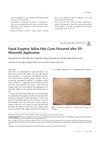 3 citations,
January 2018 in “Annals of Dermatology”
3 citations,
January 2018 in “Annals of Dermatology” A woman developed facial hair cysts after using a 3% minoxidil solution for hair loss, which disappeared after stopping the treatment and removing the cysts surgically.
 June 2020 in “Journal of Investigative Dermatology”
June 2020 in “Journal of Investigative Dermatology” Scientists successfully grew mini hair follicles using human skin cells, which could help treat baldness.
 September 2019 in “The journal of investigative dermatology/Journal of investigative dermatology”
September 2019 in “The journal of investigative dermatology/Journal of investigative dermatology” Hair follicles repair 3D injuries using a 2D healing process.
 April 2019 in “The journal of investigative dermatology/Journal of investigative dermatology”
April 2019 in “The journal of investigative dermatology/Journal of investigative dermatology” HDAC inhibitors, like Vorinostat and Entinostat, can help regrow hair in alopecia areata.
 July 1998 in “Dermatologic Surgery”
July 1998 in “Dermatologic Surgery” Various techniques and tools for hair restoration were presented in 1998, including a mathematical model for donor area, use of lasers in surgery, methods for controlling grafted hair direction, and ways to increase graft yield. Satisfaction rates were around 39%, and studies showed trauma and dehydration can damage hair follicles.
 260 citations,
June 2011 in “Cell”
260 citations,
June 2011 in “Cell” Wnt signaling is crucial for pigmented hair regeneration by controlling stem cell activation and differentiation.
 205 citations,
March 2012 in “Science Translational Medicine”
205 citations,
March 2012 in “Science Translational Medicine” PGD2 stops hair growth and is higher in bald men with AGA.
 188 citations,
May 2009 in “Plant physiology”
188 citations,
May 2009 in “Plant physiology” Researchers found 19 genes important for root hair growth in a plant called Arabidopsis.
 181 citations,
January 2009 in “Nature Genetics”
181 citations,
January 2009 in “Nature Genetics” Certain mutations in a hair growth-related gene cause a type of genetic hair loss.
 125 citations,
September 2001 in “The FASEB Journal”
125 citations,
September 2001 in “The FASEB Journal” Stress can cause hair loss by negatively affecting hair follicles and this effect might be reversed with specific treatments.
 91 citations,
January 2009 in “International Journal of Trichology”
91 citations,
January 2009 in “International Journal of Trichology” Different hair evaluation methods have their own pros and cons, and using multiple methods together is best for accurate hair loss diagnosis and tracking.
 75 citations,
December 2011 in “British Journal of Dermatology”
75 citations,
December 2011 in “British Journal of Dermatology” Female pattern hair loss can be treated with medications, surgery, and cosmetic products, considering its psychological impact.
 68 citations,
February 1990 in “Journal of Applied Social Psychology”
68 citations,
February 1990 in “Journal of Applied Social Psychology” Bald men are often viewed more negatively and as older than they really are.
 42 citations,
March 2018 in “PLOS Biology”
42 citations,
March 2018 in “PLOS Biology” Autophagy is important for human hair growth and health.
 40 citations,
October 2002 in “Endocrinology”
40 citations,
October 2002 in “Endocrinology” Vitamin D3 analogs can promote hair growth in mice genetically prone to hair loss.
 33 citations,
February 2016 in “Journal of Experimental Botany”
33 citations,
February 2016 in “Journal of Experimental Botany” ROOT HAIR SPECIFIC 10 (RHS10) reduces the length of root hairs in Arabidopsis plants.
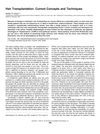 30 citations,
October 2005 in “Journal of Investigative Dermatology Symposium Proceedings”
30 citations,
October 2005 in “Journal of Investigative Dermatology Symposium Proceedings” The document concludes that hair transplantation is recommended for those not helped by medical treatments, but warns that high-density transplants may lower hair survival rates.
 27 citations,
February 2017 in “Clinical, Cosmetic and Investigational Dermatology”
27 citations,
February 2017 in “Clinical, Cosmetic and Investigational Dermatology” New compounds were found to help increase hair growth and decrease hair loss.
 24 citations,
April 2017 in “Oncology Reports”
24 citations,
April 2017 in “Oncology Reports” The hair keratin gene KRT81 is found in both normal and breast cancer cells and helps them invade surrounding tissues.
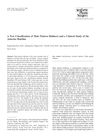 21 citations,
January 2000 in “Aesthetic Plastic Surgery”
21 citations,
January 2000 in “Aesthetic Plastic Surgery” Researchers created a new system to classify male baldness, finding six types and a common hairline shape, to improve hair loss treatments.
 20 citations,
January 2021 in “Plants”
20 citations,
January 2021 in “Plants” High energy boosts root hair growth in plants, while low energy stops it.
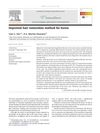 20 citations,
December 2010 in “Burns”
20 citations,
December 2010 in “Burns” PL-FUT is an effective hair restoration method for burn victims with minimal scarring and high patient satisfaction.
 20 citations,
August 2009 in “Journal of The European Academy of Dermatology and Venereology”
20 citations,
August 2009 in “Journal of The European Academy of Dermatology and Venereology” Occipital scalp affects female hair loss; terminal/vellus ratio helps diagnose androgenetic alopecia.
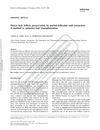 19 citations,
April 2010 in “Journal of Dermatological Treatment”
19 citations,
April 2010 in “Journal of Dermatological Treatment” Partial hair follicle extraction can effectively double the number of hair follicles for transplants, with most surviving and growing normally after a year.
 15 citations,
May 2004 in “Facial Plastic Surgery Clinics of North America”
15 citations,
May 2004 in “Facial Plastic Surgery Clinics of North America” New techniques in hair restoration surgery can fix unnatural results from old methods, improving patient self-esteem.
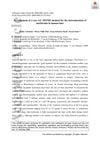 14 citations,
June 2020 in “Drug Testing and Analysis”
14 citations,
June 2020 in “Drug Testing and Analysis” A new method was created to measure metformin in hair, showing potential for monitoring treatment and medical investigations.
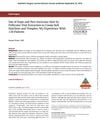 13 citations,
September 2015 in “Aesthetic Surgery Journal”
13 citations,
September 2015 in “Aesthetic Surgery Journal” Transplanting hair from the nape and around the ear to the hairline and temples generally satisfies patients and looks natural.
 12 citations,
June 1999 in “Dermatologic Surgery”
12 citations,
June 1999 in “Dermatologic Surgery” Hair restoration surgery can effectively increase pubic hair density, with patient satisfaction and natural results largely depending on the chosen hair pattern and graft design.
 11 citations,
January 2013 in “Methods in molecular biology”
11 citations,
January 2013 in “Methods in molecular biology” The method allows for 3D tracking of hair follicle stem cells and shows they can regenerate hair for up to 180 days.





























